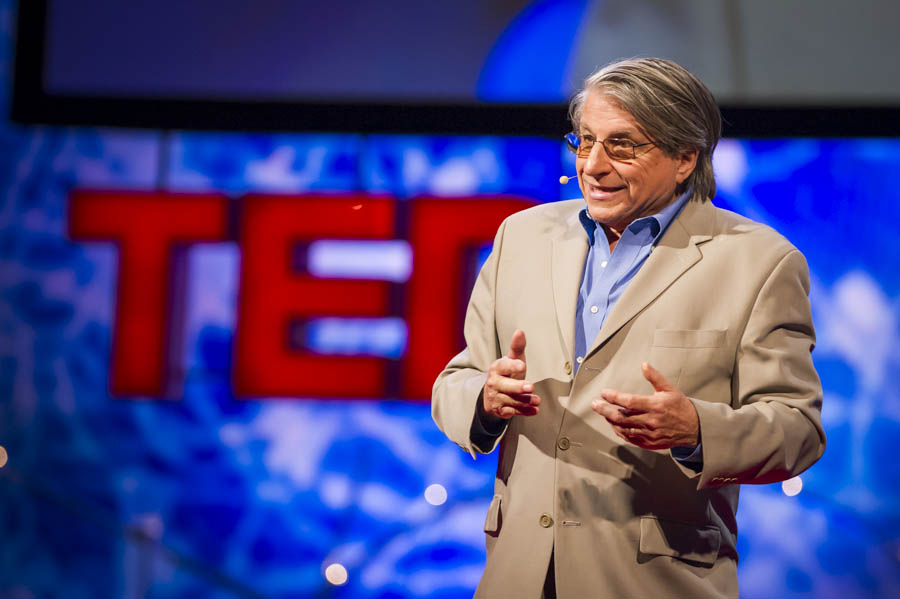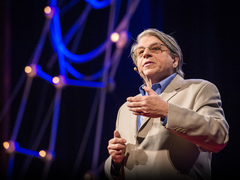
Benjamin Barber speaks on the power of mayors at TEDGlobal 2013. Photo: James Duncan Davidson
The challenges we face in the 21st century are global in nature. Yet it often seems like we are woefully ill-equipped to address issues such as poverty, violence, security or public health with our large-scale political institutions.
 Benjamin Barber: Why mayors should rule the world
In this bold talk, Benjamin Barber suggests that we should transition away from nation states towards a system of cities, where mayors rule. Why? Because, he argues, mayors are pragmatic problem solvers who are deeply involved in the issues of the cities they serve. They are “homies,” that is, people who grew up in the city. They get things done: they are responsible for fixing potholes and educating children. In contrast, Barber notes, presidents rule abstractly and distantly, governing imagined nation states from above.
Benjamin Barber: Why mayors should rule the world
In this bold talk, Benjamin Barber suggests that we should transition away from nation states towards a system of cities, where mayors rule. Why? Because, he argues, mayors are pragmatic problem solvers who are deeply involved in the issues of the cities they serve. They are “homies,” that is, people who grew up in the city. They get things done: they are responsible for fixing potholes and educating children. In contrast, Barber notes, presidents rule abstractly and distantly, governing imagined nation states from above.
Barber argues that cities are hotspots of potential for solving the challenges that face us. Most of the issues are concentrated in cities, and these governing bodies are best equipped to collaborate and address them together. Where nation states clash, cities mesh.
The 7 talks below — all from mayors who have spoken on the TED stage — put Barber’s theories into practice. Check them out:
[ted id=1886]
Enrique Peñalosa: Why buses represent democracy in action
When Enrique Peñalosa was mayor of Bogota, Colombia, he radically rethought the city’s transportation balance. Why, he asks, should cars have the priority on the streets when the card majority of citizens couldn’t afford to have them? At TEDCity2.0, Peñalosa shares how he created lanes exclusively for buses, nixed the practice of parking on sidewalks, and created loads of protected bike lanes. His bold democratization of transportation was controversial, but important. “In terms of transport, an advanced city is not one where even the poor use cars, but rather one where even the rich use public transport.”
[ted id=1429]
Eduardo Paes: The 4 commandments of cities
“Mayors have the political position to change people’s lives,” said Rio de Janeiro mayor Eduardo Paes as he opened his inspiring talk from TED2012. He shared four commandments of running cities, which in part contributed to Rio’s successful bid for the 2016 Olympics. His accomplishments, which ranged from public health programs to improving the city’s transit system, illustrate a mayor’s unique ability to bring about change in a city.
[ted id=213]
Jaime Lerner: A song of the city
Cities hold the solution to climate change, said Jaime Lerner, former mayor of Curitiba in the Brazilian state of Paraná. Standing on stage at TED2007, Lerner shared how he revolutionized the city’s urban transit system by “metronizing” the bus through a combination of efforts targeting mobility and sustainability. He launched the Bus Rapid Transit system in Curitiba in 1974; now, the system is implemented in 84 cities globally. Don’t miss his catchy song at the end of his talk espousing the possibility of sustainability.
[ted id=1664]
Edi Rama: Take back your city with paint
A small art project in Tirana, Albania seeded a renewed sense of citizenship for the city’s residents. As he shared at TEDxThessaloniki in 2012, former mayor Edi Rama took office in 2000 with a minuscule municipal budget; he nonetheless revitalized the town by adding splashes of color onto the city walls. Freshly painted façades had an incredible effect: crime dropped, the streets became safer. Citizens even started paying their taxes. This low-cost urban beautification process gave residents a sense of ownership over their city and put them back at the center of their own urban story.
[ted id=838]
Omar Ahmad: Political change with pen and paper
How do you communicate with local officials? Write a letter, advised San Carlos, California mayor Omar Ahmad at TED2010. He found that letters presented the best opportunity for honest communication with his constituents. His experience translated into a formula for effectively communicating with politicians.
[youtube=http://www.youtube.com/watch?v=HTnPXqwjGV8&w=586&h=330]
Christopher Cabaldon: A hard reboot of democracy in the city
In this inspiring talk at TEDxSacramento City2.0, West Sacramento mayor Christopher Cabaldon called for a fundamental redesign of urban democracy. Rather than adapting a slow, plodding federal model of governance, cities should create a system designed for action. The 7-time-relected-mayor proposed a digital democracy, where citizens can engage with the civic issues they care about in a medium that works for them. This system might even allow us to cross municipal borders and collectively engage in the global governance of cities.
[youtube=http://www.youtube.com/watch?v=ib-raWy_TXI&w=586&h=440]
Dale Williams: Small town big change
Motorcycle engineer and mayor Dale Williams radically reshaped the education and employment sectors of Otorohanga, a small city in northern New Zealand. Speaking at TEDxAuckland in 2013, he shared how he turned a paradoxical crisis of unemployment and low labor availability into an opportunity for the city’s young people. He designed a school-to-work program that helped support graduates in finding and keeping a local job or internship. The program has twice the retention rate as the national average, and has grown into a model copied internationally. Just as Benjamin Barber suggested, Williams illustrates how mayors are uniquely positioned to innovate solutions to local and global problems.
Note: This talk originally ran on September 20, 2013. It was updated on December 6th to include Enrique Penalosa’s talk.
Comments (9)
Pingback: Ultima Pharmaceuticals - roids.blog
Pingback: Buy Steroids with Bitcoins
Pingback: #TheMissionPodcast Resource List; Part II – rc_speaksla
Pingback: The Power of Cities | Faculty Institute on Social Entrepreneurship
Pingback: feel alive in the city | Annotary